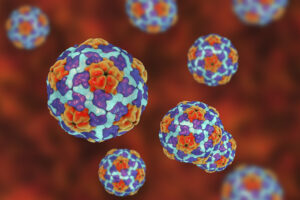In most infections of hepatitis A (HAV), individuals have very mild symptoms or are asymptomatic. Although rare in the U.S., globally HAV causes about 1.4 million cases and usually spreads via fecal-oral routes; however, case reports have documented transmission by sexual contact and transfusion. An HAV outbreak occurred in Europe from 2016 to 2019, and researchers detected a rising number of HAV cases in Poland between mid-2017 and 2019. To better understand the transfusion-transmission potential of HAV, researchers in Poland screened 1,866,590 blood donations from 1,210,423 donors in mini-pools for HAV between 2017 to 2019. During the outbreak, 28 HAV positive blood donations from 21 donors were identified (n=13 donors from 2017, n=6 from 2018, and n=2 from 2019). A total of 54 HAV positive blood components were prepared, and 37 units were transfused (23/27 HAV positive RBC units, 13/27 platelets, and 1/28 plasma units). Of the 12 HAV positive blood components that were traced after transfusion to seven patients, two cases of transfusion-transmitted HAV were identified (28.6%)—one asymptomatic and one symptomatic infection. Follow-up samples from 20-HAV infected donors revealed HAV-RNA persisted for a maximum of 125 days. Based on these results and the identification of a HAV reactive donor after vaccination, a 6-month donor deferral after HAV infection and 14 days post HAV vaccination may be prudent to protect patients from HAV transfusion-transmission.
Reference:

